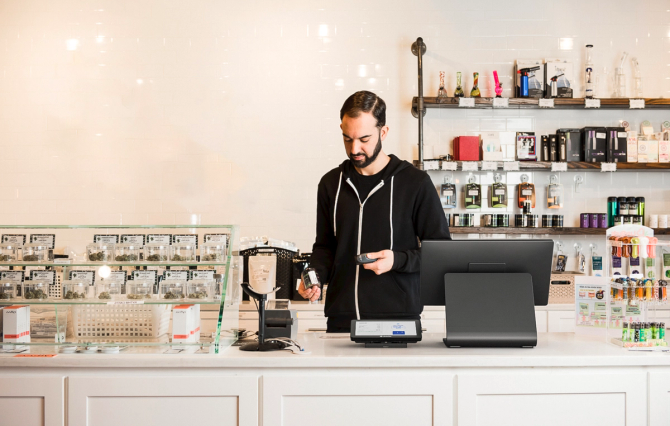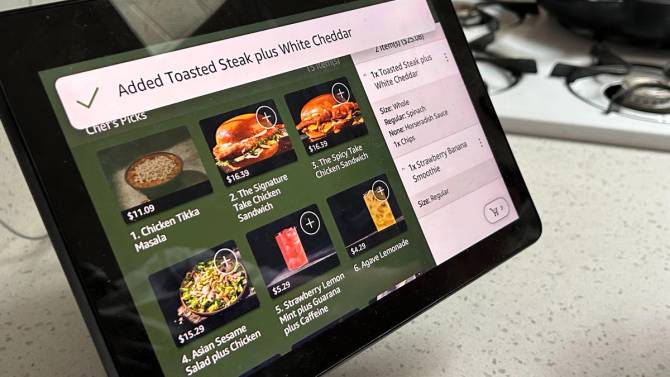Good afternoon, everyone. In case you missed it, yesterday was technically National Grilled Cheese Day, so of course a New York City restaurant offered up a grilled cheese sandwich for $214. It’s a friendly reminder to count your lucky stars that we give this newsletter out for free (while fully appreciating your support!)
In today’s edition:
—Andrew Adam Newman, Maeve Allsup, Jeena Sharma
|
|
Dutchie
New laws allow recreational cannabis sales in more than 20 states, but it remains illegal under federal law, making starting a retail cannabis business complicated. This is Part 4 of a series, Spliff & Mortar.
Suppose you’ve owned a lot of retail businesses, and with recreational cannabis now legal in many states, you’re opening a new business in that space. For all those sales you’ll be ringing up, you’ll need a point-of-sale (POS) system. Maybe you’re thinking you’ll just use a popular POS solution you’ve used for other ventures, like Shopify or Square.
Think again.
Both Shopify and Square permit payments for CBD products, which are derived from hemp but lack the levels of THC that get users high. CBD products are legal under federal law. But when it comes to recreational marijuana, even in a state that’s legalized it, both companies ban using their software.
-
Square’s website says it prohibits transactions for products with more than 0.3% THC, the federally legal threshold, along with “paraphernalia, bongs, [and] pipes.”
-
Shopify—which is based in Canada, where cannabis is legal—permits selling cannabis only in Canada. But everywhere else, including the US, its website states it limits the sale to only “hemp or hemp-derived products” if they’re legal under local law and contain no more than 0.3% of THC.
But don’t despair, ganjapreneur. Dutchie, which is based in Oregon, is among a growing number of POS systems that not only welcome cannabis companies, but design software specifically for them. And because the legality and regulatory environment for cannabis is so complicated, a POS system designed for cannabis may be exactly what you need.
Keep reading here.—AAN
|
|
|
Brutal e-commerce stat incoming: 77% of online shopping carts are eventually abandoned. And one of the leading causes for that are long, drawn-out checkout experiences.
But here’s one of the best things you can do for your e-commerce conversion rate: Streamline your checkout experience. Take a look at Bolt’s latest case study, showcasing how Benefit Cosmetics saw a huge boost in their conversion rates by cutting clicks. Bolt helped Benefit Cosmetics achieve stats like:
- a 24.2% increase in site conversion rates
- an 82% increase in checkout rates
Like the look of those numbers? It’s all thanks to Bolt’s One-Click Checkout, which helps you provide a quick and seamless one-click checkout experience to returning and guest shoppers alike—and level up your numbers, too.
Get all the details and see how you can boost your conversion rates with just one click.
|
|
Amazon
Panera Bread is seemingly all-in on implementing emerging technologies at its restaurants. Or maybe it’s just all-in on its partnership with Amazon.
Toward the end of March, the chain became the first national restaurant to use Amazon’s biometric scanning software, Amazon One, rolling out palm scanning for users of the MyPanera loyalty program. Less than two weeks later, Panera announced it had teamed up with Amazon’s Alexa Skills team to offer improved AI-powered voice ordering.
Alexa, Amazon’s voice assistant technology, has long powered voice ordering for retailers (including Domino’s and Dunkin’). But the latest update to Amazon’s Food Skills API offers a smoother, more conversational ordering experience, and only recently became possible, thanks to major advances in artificial intelligence.
“The future is really about going from thought to order in a matter of seconds,” said Mark Yoshitake, GM and director of Alexa Skills. “We had this dream of being able to do this when we first started, many, many, many years ago, but the technology…in terms of being able to handle the language variation, was just not available.”
The updated Food Skills API that Panera recently implemented is distinct from the voice ordering used by other retailers because it uses conversational AI, which means the ordering experience can replicate an in-person scenario.
Keep reading here.—MA
|
|
AI Fashion Week
Move over, physical and digital fashion weeks—AI Fashion Week is in town. On April 20 and 21 at Spring Studios in NYC, emerging AI designers—that is, designers who use AI, not actual robots—will present collections both online and IRL.
The event will function as a competition judged by the voting public. Hundreds of applicants have entered so far. A jury—featuring some notable names like Tiffany Godoy, Vogue Japan’s head of editorial content; Erika Wykes-Sneyd, VP of Adidas’s Three Stripes Studio; and Matthew Drinkwater, head of London College of Fashion’s Fashion Innovation Agency, among others—will pick three winners from among 10 shortlisted finalists. The winners will be supported by AIFW’s fashion-tech incubator and e-commerce retailer Revolve Group.
While the event is sure to invite curiosity and excitement, it also raises a number of questions, a big one being: To what extent will AI replace human design jobs in fashion?
Keep reading here.—JS
|
|
Today’s top retail reads.
Unsubscribe: When it comes to overloading on subscriptions, the usual suspects are the streaming giants, but with a saturated market, subscription fatigue is also spilling over into meal delivery services like HelloFresh, which expects its active subscriber count to drop in the first half of 2023. (the Wall Street Journal)
Fast-food face-off: Inflation has positioned McDonald’s to compete with some higher-end fast food chains, but now the company poses a threat to Starbucks if it invents more in coffee. “With espresso machines and baristas, McDonald’s can compete against Starbucks,” Attorney Maria Hossain of The Missing Ingredient told International Business Times. (IBT)
Meh-taverse: Many brands tried to make the metaverse happen, but it’s not happening. After many invested in metaverse offerings through branding and marketing efforts, those same companies are now pulling back and might not be able to recoup their investments. (Modern Retail)
|
|
-
Juul Labs reached a $462 million settlement with a handful of states that claimed the company “aggressively marketed its e-cigarettes to young people and fueled a vaping crisis.”
-
Madison Reed has introduced a new tier-based loyalty program.
-
USPS is increasing the price of stamps to 66 cents.
-
Rent the Runway narrowed losses in Q4 but still fell below analyst expectations.
-
LVMH reported a strong Q1 on the back of a rebound from Covid-19 lockdowns in China.
-
Mary Quant, the pioneering British designer who epitomized Swinging Sixties fashion, died at 93.
|
|
The numbers you need to know.
Yesterday’s consumer price index report showed inflation continuing to slow down, and that’s translating in the e-commerce world.
Online prices in March dropped 1.7% YoY with 10 of 18 categories tracked by Adobe seeing falling prices on a yearly basis, according to the company’s latest Digital Price Index. Prices remained flat compared to February.
- Much of the decline, according to Adobe, was driven by drops in discretionary categories like electronics (12.9%), toys (6.6%), and appliances (4.9%).
- On the other hand, grocery prices were still up 10.3% YoY, only slightly down from February’s 11.4% bump. Although inflation remains high in this category, Adobe noted that it’s the sixth consecutive month inflation has dropped.
-
Also, Adobe reported last month that inflation isn’t preventing customers from online grocery shopping. Consumers spent $73.7 billion in the digital grocery market during the first year of the pandemic in 2020 and are expected to buy $85 billion in online groceries this year. Groceries now also account for 8.9% of the total e-commerce market.
Eight categories saw YoY increase including personal care, office supplies, pet products, non-prescription drugs, groceries, home improvement, medical care/supplies, and apparel.
|
|
Catch up on the Retail Brew stories you may have missed.
|
|
|
Written by
Andrew Adam Newman, Maeve Allsup, and Jeena Sharma
Was this email forwarded to you? Sign up
here.
Take The Brew to work
Get smarter in just 5 minutes
Business education without the BS
Interested in podcasts?
|
ADVERTISE
//
CAREERS
//
SHOP 10% OFF
//
FAQ
Update your email preferences or unsubscribe
here.
View our privacy policy
here.
Copyright ©
2023
Morning Brew. All rights reserved.
22 W 19th St, 4th Floor, New York, NY 10011
|
|







